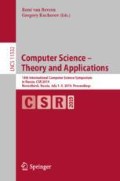Abstract
We study algorithms for solving Subtraction games, which are sometimes referred as one-heap Nim games.
We describe a quantum algorithm which is applicable to any game on DAG, and show that its query complexity for solving an arbitrary Subtraction game of n stones is \(O\left( n^{3/2}\log n\right) \).
The best known deterministic algorithms for solving such games are based on the dynamic programming approach [8]. We show that this approach is asymptotically optimal and that classical query complexity for solving a Subtraction game \(\varTheta \left( n^2\right) \) in general.
Of course, this difference between classical and quantum algorithms is far from the best known examples, but, up to our knowledge, this paper is the first constructive “quantum” contribution to the algorithmic game theory.
Access this chapter
Tax calculation will be finalised at checkout
Purchases are for personal use only
References
Ablayev, F., Ablayev, M., Khadiev, K., Vasiliev, A.: Classical and quantum computations with restricted memory. In: Böckenhauer, H.-J., Komm, D., Unger, W. (eds.) Adventures Between Lower Bounds and Higher Altitudes. LNCS, vol. 11011, pp. 129–155. Springer, Cham (2018). https://doi.org/10.1007/978-3-319-98355-4_9
Ablayev, F., Ambainis, A., Khadiev, K., Khadieva, A.: Lower bounds and hierarchies for quantum memoryless communication protocols and quantum ordered binary decision diagrams with repeated test. In: Tjoa, A.M., Bellatreche, L., Biffl, S., van Leeuwen, J., Wiedermann, J. (eds.) SOFSEM 2018. LNCS, vol. 10706, pp. 197–211. Springer, Cham (2018). https://doi.org/10.1007/978-3-319-73117-9_14
Ablayev, F., Gainutdinova, A., Khadiev, K., Yakaryılmaz, A.: Very narrow quantum OBDDs and width hierarchies for classical OBDDs. Lobachevskii J. Math. 37(6), 670–682 (2016)
Ablayev, F., Gainutdinova, A., Khadiev, K., Yakaryılmaz, A.: Very narrow quantum OBDDs and width hierarchies for classical OBDDs. In: Jürgensen, H., Karhumäki, J., Okhotin, A. (eds.) DCFS 2014. LNCS, vol. 8614, pp. 53–64. Springer, Cham (2014). https://doi.org/10.1007/978-3-319-09704-6_6
Ambainis, A.: Understanding quantum algorithms via query complexity. arXiv preprint arXiv:1712.06349 (2017)
Benjamin, S.C., Hayden, P.M.: Multiplayer quantum games. Phys. Rev. A 64(3), 030301 (2001)
Boyer, M., Brassard, G., Høyer, P., Tapp, A.: Tight bounds on quantum searching. Fortschritte der Physik 46(4–5), 493–505 (1998)
Cormen, T.H., Leiserson, C.E., Rivest, R.L., Stein, C.: Introduction to Algorithms, 2nd edn. McGraw-Hill, New York (2001)
De Wolf, R.: Quantum computing and communication complexity. Ph.D. thesis (2001)
Eisert, J., Wilkens, M.: Quantum games. J. Mod. Opt. 47(14–15), 2543–2556 (2000)
Eisert, J., Wilkens, M., Lewenstein, M.: Quantum games and quantum strategies. Phys. Rev. Lett. 83(15), 3077 (1999)
Ferguson, T.S.: Game theory class notes for math 167, fall 2000 (2000). https://www.cs.cmu.edu/afs/cs/academic/class/15859-f01/www/notes/comb.pdf
Grover, L.K.: A fast quantum mechanical algorithm for database search. In: Proceedings of the Twenty-Eighth Annual ACM Symposium on Theory of Computing, pp. 212–219. ACM (1996)
Grundy, P.M.: Mathematics and games. Eureka 2, 6–8 (1939)
Ibrahimov, R., Khadiev, K., Prūsis, K., Yakaryılmaz, A.: Error-free affine, unitary, and probabilistic OBDDs. In: Konstantinidis, S., Pighizzini, G. (eds.) DCFS 2018. LNCS, vol. 10952, pp. 175–187. Springer, Cham (2018). https://doi.org/10.1007/978-3-319-94631-3_15
Jordan, S.: Bounded error quantum algorithms zoo. https://math.nist.gov/quantum/zoo
Khadiev, K., Khadieva, A.: Reordering method and hierarchies for quantum and classical ordered binary decision diagrams. In: Weil, P. (ed.) CSR 2017. LNCS, vol. 10304, pp. 162–175. Springer, Cham (2017). https://doi.org/10.1007/978-3-319-58747-9_16
Khadiev, K., Khadieva, A., Mannapov, I.: Quantum online algorithms with respect to space and advice complexity. Lobachevskii J. Math. 39(9), 1210–1220 (2018)
Khadiev, K., Safina, L.: Quantum algorithm for dynamic programming approach for dags. Applications for zhegalkin polynomial evaluation and some problems on dags. In: Proceedings of Unconventional Computation and Natural Computation 2019. LNCS, vol. 11493 (2019). https://doi.org/10.1007/978-3-030-19311-9_13
Nielsen, M.A., Chuang, I.L.: Quantum Computation and Quantum Information. Cambridge University Press, New York (2010)
Sprague, R.P.: Über mathematische kampfspiele. Tohoku Math. J. 41, 438–444 (1935)
Acknowledgement
The research is supported by PostDoc Latvia Program, and by the ERDF within the project 1.1.1.2/VIAA/1/16/099 “Optimal quantum-entangled behavior under unknown circumstances”.
The reported study was funded by RFBR according to the research project No. 19-37-80008.
We would like to thank the anonymous reviewers for their detailed and helpful comments. We also thank Dr. Abuzer Yakaryılmaz for the proofreading.
Author information
Authors and Affiliations
Corresponding author
Editor information
Editors and Affiliations
Rights and permissions
Copyright information
© 2019 Springer Nature Switzerland AG
About this paper
Cite this paper
Kravchenko, D., Khadiev, K., Serov, D. (2019). On the Quantum and Classical Complexity of Solving Subtraction Games. In: van Bevern, R., Kucherov, G. (eds) Computer Science – Theory and Applications. CSR 2019. Lecture Notes in Computer Science(), vol 11532. Springer, Cham. https://doi.org/10.1007/978-3-030-19955-5_20
Download citation
DOI: https://doi.org/10.1007/978-3-030-19955-5_20
Published:
Publisher Name: Springer, Cham
Print ISBN: 978-3-030-19954-8
Online ISBN: 978-3-030-19955-5
eBook Packages: Computer ScienceComputer Science (R0)

